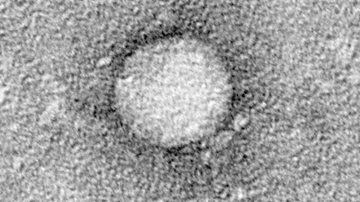Vaccine research: new hope in the fight against hepatitis C
Innovative vaccine design with broad effect
Electron micrograph of a hepatitis C virus particle purified from cell cultures. Particle-diameter: approx. 50 nanometers.
The development of an effective vaccine against the hepatitis C virus has been an enormous challenge for decades due to the high genetic diversity of the virus. The research team led by DZIF scientist Prof. Thomas Krey from the Universität zu Lübeck, in collaboration with international partners, has now achieved an important breakthrough: using so-called “epitope-focused immunogens”, broadly neutralising antibodies have been induced in laboratory models for the first time. The promising results of the study have been published in the renowned journal Science Advances.
Around 58 million people worldwide are chronically infected with the hepatitis C virus (HCV), resulting in 290,000 deaths per year from secondary diseases such as liver cirrhosis and liver cancer. Although modern antiviral drugs achieve high cure rates, the global elimination of HCV remains an elusive goal due to a lack of early detection and limited treatment options. HCV is also classified in the WHO's “Immunisation Agenda 2030” as one of the globally prioritised endemic pathogens for vaccine research and development. It is one of the pathogens for which there is an urgent need for vaccines, as it causes a significant burden of disease. An effective vaccine could close this gap and curb the spread of the virus.
Innovative research approach
“Our research lays the foundation for a new generation of vaccines. We are focusing on overcoming the challenges of viral diversity and the immunological camouflage of HCV,” explains Prof. Krey, scientist in the research area “Infections of the Immunocompromised Host” at the German Center for Infection Research (DZIF). The team used novel structural designs to replicate specific areas of the viral glycoproteins E1 and E2, so-called neutralisation epitopes. These were transferred to synthetic protein carriers and integrated into nanoparticles in order to trigger the most effective immune response possible. The study showed that these epitope-focussed immunogens trigger a strong immune response, particularly in mouse models with a human antibody repertoire. The antibodies produced were able to successfully neutralise several genetically different HCV strains.
New standards in vaccine development
The results of this study provide a promising approach to overcoming the previously failed attempts to develop an effective HCV vaccine. “This proof-of-concept approach not only brings us closer to a concrete vaccine against HCV, but could set new standards in vaccine development against this and other medically important viruses,” says Dr Kumar Nagarathinam, first author of the study.
The study is a significant step forward in vaccine research and could contribute in the long term to curbing the global spread of hepatitis C. Future research is aimed at further increasing the effectiveness of the immunogens and transferring them to clinical trials. The findings could also be transferred to other viruses that pose similar challenges for vaccine development.
Source: Press release of the Universität zu Lübeck (in German)




